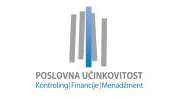Kontakt podaci

Poslovna učinkovitost d.o.o.
Pete Poljanice 11
10000 Zagreb
Tel: 01 2304 571
Fax: 01 2922 915
E-mail: [email protected]
Web: www.poslovnaucinkovitost.eu
O ustanovi
Certified Management Accountant (CMA) - Level 2
Trajanje: | 10. rujan 2015. |
|---|---|
Mjesto održavanja: | Zagreb |
CMA Certification - the international standard for professionals in Controlling. The Certified Management Accountant (CMA) credential is an advanced professional certification that demonstrates your command of the critical accounting and financial management skills demanded by today’s international businesses. Like the CFA for the banking industry and the CPA for auditing companies, the CMA sets a standard for professionalism in its field management accounting. In the last 40 years more than 30,000 professionals worldwide have earned this essential credential.
 WE ARE ORGANIZING PREPARATION COURSES FOR CMA:
WE ARE ORGANIZING PREPARATION COURSES FOR CMA:2nd LEVEL – 10/09/2015– 12/09/2015
Date and place of the training:
10.09. – 12.09.2015., Zagreb (2nd LEVEL)
CMA, IMA, Controller Institut and Poslovna ucinkovitost
The CMA is offered and developed by the Institute of Management Accountants (IMA), the worldwide association for accountants and financial professionals working in business. IMA has more than 60,000 members worldwide and is committed to expand your professional skills, better manage your organization, and enhance your career.
The Controller Institut has established an exclusive partnership with IMA® (Institute of Management Accountants) to form IMA’s sixth European chapter in Austria, and this program is organized in Croatia together with Poslovna ucinkovitost.
CMA Exam and Preparation Course
The CMA exams are computer-based tests that are administered in independent testing facilities in Zagreb. The exam has two parts, one focusing on „Financial Planning, Performance and Control“, the other on „Financial Decision Making“. Every part is covered by elaborate study materials. The exam is demanding and challenging: more than half of candidates do not succeed on the first attempt.
The preparation course focusses on exam preparation and intensive test training. The experienced trainers give an overview of all relevant exam areas and concentrate on problem solving techniques and test questions. The IMA recommends a minimum of 200 hours of preparation per level. This course does not compensate for this learning investment, but helps you to translate your learning efforts into the best test result.
Participants
The intensive workshop focusses on exam preparation. It addresses all candidates who want enhance their career by attaining an international certification and complete the CMA exam. To register for the CMA–Exam, an academic degree (min. Bachelor) and specific work experience is required as well as the personal membership at „Klub kontrolera“ and IMA.
CMA preparation package - the fast track to the CMA
Poslovna ucinkovitost offers a unique package to enable you to succeed efficiently at your CMA exam.
CMA preparation package
• preparation for level I and level II of the CMA exam
• individual coaching and training
• experienced trainer holding the CMA credential
Additional requirements (not covered by this offer)
• membership at „Klub kontrolera“/IMA
• registration for the exams at IMA and exam fees
• qualification and ethical requirements
Information on the requirements for CMA certification (Eligibility Criteria)
Introduction
The CMA program is rigorous and relevant. The two part testing format requires a mastery of the critical skills and knowledge involved in planning, analysis, control and decision support. Candidates for CMA certification must complete the following two examination parts which can be taken in any order:
Part 1: Financial Planning, Performance and Control (4 hours – 100 multiple – choice questions and two 30 - minute essay questions)
Part 2: Financial Decision Making (4 hours – 100 multiple - choice questions and two 30 - minute essay questions)
The exams can be taken any day from Monday to Saturday during the following three testing windows:
• January and February
• May and June
• September and October
It is possible but not necessary to do all two exams in one testing window.
To obtain the CMA certification, you must fulfil all of the following requirements:
1. Become a member of the Institute of Management Accountants (IMA)
2. Enter the CMA - Program
3. Register for the CMA Examinations
4. Register for an exam date, take and pass the exam
5. Satisfy the Education and Experience Qualification (within 7 years of passing the exam)
6. Comply with the IMA Statement of Ethical Professional Practice
For additional/detailed instructions read short brief here or contact us: [email protected]
Exam Areas
Part One
Section A: Planning, Budgeting, and Forecasting
Topic 1: Budgeting Concepts
Topic 2: Forecasting Techniques
Topic 3: Budgeting Methodologies
Topic 4: Annual Profit Plan and Supporting Schedules
Topic 5: Top-Level Planning and Analysis
Section B: Performance Management
Topic 1: Cost and Variance Measures
Topic 2: Responsibility Centers and Reporting Segments
Topic 3: Performance Measures
Section C: Cost Management
Topic 1: Measurement Concepts
Topic 2: Costing Systems
Topic 3: Overhead Costs
Topic 4: Operational Efficiency
Topic 5: Business Process Performance
Section D: Internal Controls
Topic 1: Risk Assessment, Controls, and Risk Management
Topic 2: Internal Auditing
Topic 3: Systems Controls and Security Measures
Section E: Professional Ethics
Topic 1: Ethical Considerations for Management Accounting and Financial Management Professionals
Part Two
Section A: Financial Statement Analysis
Topic 1: Basic Financial Statement Analysis
Topic 2: Financial Performance Metrics – Financial Ratios
Topic 3: Profitability Analysis
Topic 4: Analytical Issues in Financial Accounting
Section B: Corporate Finance
Topic 1: Risk and Return
Topic 2: Managing Financial Risk
Topic 3: Financial Instruments
Topic 4: Cost of Capital
Topic 5: Managing Current Assets
Topic 6: Raising Capital
Topic 7: Corporate Restructuring
Topic 8: International Finance
Section C: Decision Analysis and Risk Management
Topic 1: Cost/Volume/Profit Analysis
Topic 2: Marginal Analysis
Topic 3: Pricing
Topic 4: Risk Assessment
Section D: Investment Decisions
Topic 1: Capital Budgeting Process
Topic 2: Discounted Cash Flow Analysis
Topic 3: Payback and Discounted Payback
Topic 4: Ranking Investment Projects
Topic 5: Risk Analysis in Capital Investment
Topic 6: Valuation
Section E: Professional Ethics
Topic 1: Ethical Considerations for the Organization